| General Discussion Undecided where to post - do it here. |
| Reply to Thread New Thread |
|
|
#21 |
|
|
I have difficulty sleeping most of the time . . . getting to sleep and staying asleep. When I was in my early 20's I could fall asleep easily, and get back to sleep easily if I was awakened. Those were the days! Not any more, and I don't know exactly when the change happened, but I'll guess somewhere around 28. http://www.historyofwaterfilters.com/fluoride-2.html 5) Fluoride disrupts the activity of normally functioning hormones. Fluoride can reduce levels of melatonin, the sleep hormone, in the body, causing chronic insomnia (Hileman, 1988). |
|
|
|
|
#22 |
|
|
My guess and it is a guess .......too much fluoride or low blood sugar I will look into low blood sugar. Thanks! |
|
|
|
|
#23 |
|
|
I have sleep apnea and had all the problems you folks talk about, that and I never had dreams. The sleep study confirmed no REM for me. (well to be exact 0.82% of the night I had REM)
Now I got the CPAP machine that gives me the best sleep ever 6 hours now is better rest than 12+ before. Only thing that has ever come close is being way way out in the mountians for a few weeks. (like 100 milies from the nearest power line way out there). |
|
|
|
|
#24 |
|
|
|
|
|
|
|
#25 |
|
|
|
|
|
|
|
#26 |
|
|
k-os, do you get very tired during the afternoon? I do and I'm pretty sure it's because I usually get short sleep so I'm in a biphasic sleep pattern.
Comparison of sleep patterns 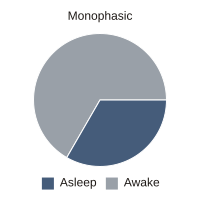 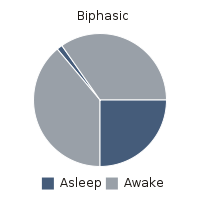 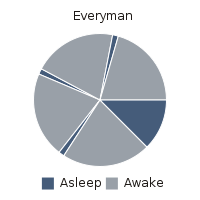 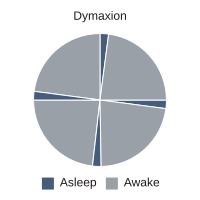 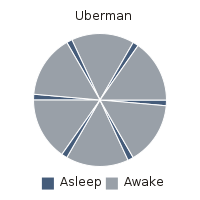 [18] [18]http://en.wikipedia.org/wiki/Polypha...sleep_patterns http://en.wikipedia.org/wiki/Polyphasic |
|
|
|
|
#27 |
|
|
k-os, do you get very tired during the afternoon? I do and I'm pretty sure it's because I usually get short sleep so I'm in a biphasic sleep pattern. The different sleep patterns look really interesting. Thanks! Kali, I need to try getting some sweaty exerciseto see if that helps. Good idea for all of us. 
|
|
|
|
|
#28 |
|
|
Intensive farming has drained the soil of nearly all its magnesium, which is very important for good sleep. I suggest everyone with trouble sleeping buy some magnesium citrate, get 40+ minutes of low intensity exercise (walking the dog), and install f.lux (google it). Also, turn off all your lights within 3 hours of when you want to sleep. Lights screw up your natural sleep patterns.
|
|
|
|
|
#29 |
|
|
|
|
|
|
|
#30 |
|
|
Dunno wtf is going on. It's 2am and I'm wide awake. Puts me to sleep too. And between 2 and 4 AM the alcohol wears off and I wake up in a panic... what I'm panicking about varies but the schedule is always the same. Like others have said, it seems like 2:30 AM is my time to wake up for no good reason. "The primary stress-response hormone produced by your adrenal glands is called cortisol. It is even more potent in some ways than adrenaline, but at normal levels it is not agitating, rather it is strengthening. It's your wake-up-and-tackle-life's-challenges hormone. Cortisol levels are supposed to be highest in the morning and lowest between about midnight and 4:00AM. If levels are too high, you'll feel wired, tense and hyper-vigilant. Our cortisol levels always rise above the normal level to help us cope with severe stress. This can happen, for example, during a divorce or as a reaction to withdrawal from medications, like benzodiazepines or antidepressants, often causing severe agitation and insomnia. [Or thinking too much about DOOOOM!!!] Cortisol levels should return to normal after the stress is relieved, but sometimes chronic stress goes on for so long that the adrenals make a permanent adaptation to a new, hyper level of cortisol production. Eventually, our adrenals can become so exhausted by this constant demand for extreme cortisol production that they are no longer able to produce even moderate levels. Their cortisol output can drop too low throughout the day, especially in the late afternoon. This can be experienced as a sudden crash or a gradually increasing fatigue. But, surprisingly often, 1 - 5 AM cortisol surges persist for years, causing chronic insomnia. Testing: Whether you are in sudden or chronic over-stress. A simple one-day (4-sample) home saliva test will reveal your bedtime and early morning cortisol levels as well as your mid-morning and late afternoon levels. See the Adrenal Tool Kit, for details on testing the levels of this vital indicator. If you wake up between 1:00 a.m. and 5:00a.m., ask for an extra (fifth) test vial. The reference range should be the same or lower than the bedtime range. Sleep disturbance: If cortisol levels are too high at night, instead of very low, as they're supposed to be, you'll be kept up too late with a "second wind." Or your cortisol levels could rise too high early in the morning and wake you up prematurely. Or you could wake up between 2:00 and 4:00AM and not be able to get back to sleep easily. Are you a night owl? Testing may show that your cortisol is above normal levels between 10:00PM and midnight when it should be dropping to allow you to get to sleep. From "IDENTIFYING AND CORRECTING ELEVATED CORTISOL LEVELS" which is a section in The Mood Cure book. |
|
|
|
|
#31 |
|
|
Intensive farming has drained the soil of nearly all its magnesium, which is very important for good sleep. I suggest everyone with trouble sleeping buy some magnesium citrate, [snip other good non-magnesium-related info.] Old Herb Lady, the health food dude told me that Calcium and Magnesium would help me sleep. What do you think about that? (I have been taking it, but don't notice a difference.) If you consume dairy foods and a lot of greens, it's likely that you're not calcium-deficient. It seems like most people are magnesium-deficient. One of the best ways to find out if you're magnesium deficient is to monitor your chocolate cravings. When I'm consuming enough magnesium, I don't even think about eating it. And I'm usually a choco-holic!  Magnesium Deficiency Triggers or Causes The Following Conditions:
From "The Magnesium Miracle" |
|
|
|
|
#32 |
|
|
Yep. Despite doing all the "right" things like eating well, exercising and taking magnesium, I often wake up with a sense of dread. It is part of the reason why I started smoking, which is the only thing that takes the edge off for me. However, I have noticed that I don't "need" to smoke as much now that the holidays are over, especially Kitschmas. The other day I completely forgot to smoke. Yesterday I had a couple and today I've only had one (some effing "heroin-like addiction"). But I have noticed that when I don't smoke a cigarette in the evening, I'm most likely to wake up with heart-pounding anxiety and the fear that something bad is about to happen. I guess I should be glad it's usually 7 or 8 a.m. rather than 2. 
|
|
|
|
|
#35 |
|
|
Take a couple of puffs on a fatty, that'll put you to sleep. Works for me.......... Its all natural and organic too, regardless of what the "government experts" say. |
|
|
|
|
#36 |
|
|
I am actually sleeping through the night for the past week! But it's not without some complications. . .
I resisted long enough, and decided to try sleeping on my back. Before, I normally slept on my stomach with one arm over my head. Now I am sleeping on my back with a pillow underneath my knees. Within the last week I have just developed some sciatic nerve symptoms (lower back/leg pain) and even stayed in bed a whole day because of it. Ouch! Not sure about the correlation/causation, but the timing is a little too coincidental for comfort. I tried sleeping without the pillow underneath my legs, but my legs were asleep when I woke up. The painful, pins and needles kind (not the pun intended kind). It's a testament to how much I love sleep that I'm still sleeping on my back - sciatica be damned - I'll just stretch more.  What's weird (and not painful) about my new sleep position is that when I wake up, one or both arms are over my head. |
|
|
|
|
#37 |
|
|
|
|
|
| Reply to Thread New Thread |
«
Previous Thread
|
Next Thread
»
| Currently Active Users Viewing This Thread: 1 (0 members and 1 guests) | |
|
|






 Linear Mode
Linear Mode


